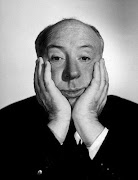As I predicted last time, we’ve ended up with a really excellent, unique book in
A Sea of Alone: Poems for Alfred Hitchcock. We’ve got Gary A. Braunbeck’s meditation on the Master of Suspense late in life, as
Frenzy is about to open. We’ve got Richard Lupoff’s fanciful sonnet sequence in which Hitchcock, Janet Leigh, Anthony Perkins, and Robert Bloch all meet in the afterlife to discuss
Psycho. We’ve got Lisa Morton’s touching reminiscence about her father and
The Birds. We’ve got Michael A. Arnzen’s inventive crossing of
Marnie with the mother of a certain well-known motel owner. And we’ve got great new work by John Palisano, Bev Vincent, Steve Rasnic Tem, and a host of others.
What we don’t have quite yet is a book-length manuscript. We’re close, but although we’ve gotten lots of excellent submissions, we still need a little more good work.
So we’re opening up for submissions again
through April 10. Please note that this is a
one-time-only extension; after that date, the book will be closed for good and all. For this final push, I’m willing to read any new single-poem submission from any writer, whether or not you’ve submitted to this project before. The poem must be previously unpublished (and must not, obviously, be one I’ve already rejected — new submissions only). If you’ve written it and it’s in some way connected to Hitchcock, I’ll read it.
I’ve read a lot of poems for this anthology at this point, so let me offer some suggestions on what we are and are not looking for.
- Please do not send poems focused primarily on Psycho, The Birds, Rope, or The 39 Steps. Also, no more on the early, unfinished project Thirteen.
- I welcome poems about Hitchcock’s youth, but please, no more poems about the time his father sent him to the police station and he was locked in a cell for five minutes. I’ve read that one too many times now.
- I have received very little material about Hitchcock’s early filmmaking days. I continue to be interested in finding poems about his silent films and early talkies. I would especially welcome poems which can vividly re-create that long-ago world of early moviemaking — poems that make us see, hear, and feel what it was like to be on a set then, or in an editing room.
- I definitely want to see poems which offer psychological insight into Hitchcock, but too many of the poems I’ve gotten along this line seem to be informed entirely by Donald Spoto’s Dark Side of Genius biography. It’s inarguably an important work on Hitchcock, but it’s also one-sided and tends toward the muckraking. Please consult other sources as well. I have no problem with poems about Hitchcock’s “dark side,” but poems which simply repeat the gamier material from Spoto’s book aren’t very interesting to me.
- Does no one remember how witty Hitchcock was — both the man and his films? Why do so few of the poems I’ve received deal at all with Hitchcock’s wonderful humor?
- Along similar lines, I’ve received practically no work which deals with the lighter, glossier films — To Catch a Thief, say, or North by Northwest. Hitchcock made some of the most charming movies of all time — I’d love to see that represented in the book.
- One true oddity of the submissions taken as a whole is that I have received more poems about Rope than about Vertigo — or, for that matter, than about Rebecca, Notorious, The Man Who Knew Too Much (either version), Strangers on a Train...the list goes on. Maybe prospective writers have decided to go for the less-obvious choices, but that’s left a lot of major work unmentioned in the book. That’s a shame. I’d like to change that.
- I would like to see more poems focused on Hitchcock and his family, friends, and/or fans.
- I would like to see more poems which create a vivid personal connection to Hitchcock’s work — memories of seeing a given film for the first time, say, or staying up late at night to watch Alfred Hitchcock Presents (a series which has gone practically unmentioned in the submissions I’ve gotten so far).
- Perhaps most of all, though, please remember that we’re looking for poems which offer something unique. Don’t be afraid of going a bit out on a limb. Many of the best poems I’ve gotten have been highly unusual in their approach — their form, their structure, their subject matter — while the weakest ones seem to take this project as some kind of assignment, mechanically reciting facts about Hitchcock’s career or summarizing the events in a given film. Let your subconscious do some of the work here. Free-associate. Dream. And see what happens!


